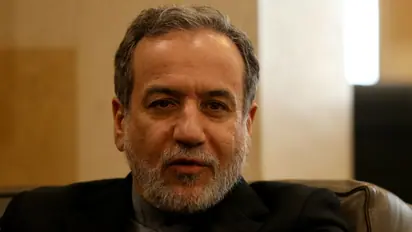'Don't test our will': Iran issues strong warning of retaliation if Israel attacks its infrastructure

Synopsis
Iranian Foreign Minister Abbas Araghchi issued a stern warning to Israel on Tuesday, asserting that any attack on Iran's infrastructure would trigger a swift and robust retaliation.
In a dramatic escalation of hostilities in the Middle East, Iranian Foreign Minister Abbas Araghchi issued a stern warning to Israel on Tuesday, asserting that any attack on Iran's infrastructure would trigger a swift and robust retaliation. This statement comes in the wake of recent missile strikes from Tehran targeting Israel, heightening tensions in a region already fraught with conflict.
“Any attack on Iran’s infrastructure will lead to retaliation. We advise the Zionist regime not to test Iran’s will,” Araghchi declared, underscoring Iran’s resolve in the face of perceived aggression. His comments reflect a broader narrative of escalating confrontation between the two nations, which have long been engaged in a shadow war marked by covert operations and assassinations.
The situation has been further complicated by Israel's military operations in Lebanon, aimed at the Iranian-backed Hezbollah militia. On Tuesday, the Israeli Defense Forces (IDF) intensified their campaign against Hezbollah by eliminating the commander of the group's headquarters in Beirut. This move is seen as a significant blow to Hezbollah, which has already suffered the loss of its leader, Hassan Nasrallah, in an airstrike in late September. These actions signal Israel's commitment to dismantling Iranian influence in the region and maintaining its strategic advantage.
The recent military engagements have raised alarm that the conflict could escalate into a wider war, potentially drawing in the United States, Israel's closest ally, and Iran, which has positioned itself as a counterbalance in the region. The prospect of full-scale conflict remains a significant concern, particularly given the oil-rich nature of the Middle East.
Amid the rising tensions, US news outlet Axios reported that Israeli officials are contemplating options that could include targeting Iranian oil facilities. Such actions would represent a serious escalation in hostilities, with the potential to disrupt global oil supplies and drive prices sharply higher. President Joe Biden, commenting on the situation, suggested that he would consider alternatives to striking Iranian oilfields if he were in Israel's position, noting that Israel has yet to finalize its response to Iran's missile attack.
The ongoing conflict has not only military implications but also economic ones, as fluctuations in oil prices could have far-reaching effects on the global economy. Analysts warn that any military action targeting Iran's oil infrastructure could provoke severe repercussions, potentially leading to a broader conflict that disrupts vital oil supplies.
The current tensions between Iran and Israel have been building over years of proxy warfare, clandestine operations, and increasingly direct confrontations. Both nations have engaged in a tit-for-tat approach, with Israel launching airstrikes on Iranian positions in Syria and Iran retaliating with missile strikes and other military actions.
As the situation develops, both domestic and international observers are closely monitoring the unfolding events. The precarious balance of power in the region hangs in the balance, with the potential for either a de-escalation of hostilities or a significant military conflict that could redefine the geopolitical landscape of the Middle East.
Check the Breaking News Today and Latest News from across India and around the world. Stay updated with the latest World News and global developments from politics to economy and current affairs. Get in-depth coverage of China News, Europe News, Pakistan News, and South Asia News, along with top headlines from the UK and US. Follow expert analysis, international trends, and breaking updates from around the globe. Download the Asianet News Official App from the Android Play Store and iPhone App Store for accurate and timely news updates anytime, anywhere.